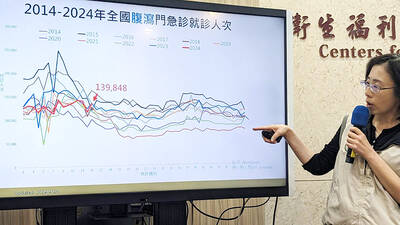Academia Sinica yesterday reported five breaches of safety protocols at one of its laboratories, which is most likely the source of a local COVID-19 case last week, the first in more than a month.
Punishment for personnel found to be at fault would be dealt with according to the law, said Minister of Health and Welfare Chen Shih-chung (陳時中), who heads the Central Epidemic Command Center (CECC).
The case is a woman in her 20s, who worked as a research assistant at Academia Sinica’s Genomics Research Center until Dec. 3. She was bitten twice by lab mice infected with COVID-19 in a biosafety level 3 lab — first in October and again last month.

Photo: Fang Pin-chao, Taipei Times
The CECC on Saturday reported that genome sequencing results and preliminary environmental surface testing suggested that the woman likely contracted the disease at the lab, not in the local community.
CECC and Academia Sinica officials were asked to report on the incident at the Legislative Yuan yesterday morning.
Academia Sinica President James Liao (廖俊智) said that a preliminary investigation found five major safety flaws at the lab, including failure to report the biting incidents in accordance with the institute’s environmental, health and safety regulations, and the lab’s standard operating procedures (SOP).
Contamination in the lab was likely caused by users’ failure to comply with SOPs, including handling infected mice only inside a biological safety cabinet and following the correct sequence in removing personal protective equipment, he said.
The research assistant was still in training and did not seem to have received adequate safety training, Liao said, adding that there was no lab manager or senior staff in the central control room monitoring the users when they were conducting experiments.
The center and the institute should enhance supervision, as well as review their supervision mechanism, he said.
Liao said that when the woman was first bitten by a mouse, she reported the incident to the lab manager, but the manger deemed it a low-risk incident and did not report it to the Genomics Research Center’s management or the institute’s biosafety committee, but only asked the woman to monitor her health.
After the woman was bitten a second time, she did not report the incident.
Based on the lab’s surveillance camera footage, three people were conducting an experiment on Nov. 24, and the woman appeared to be handling a mouse infected with the Alpha variant of SARS-CoV-2 and another one with the Delta variant, he said.
That appears to contradict statements made by people at the lab and needs further clarification, he added.
The footage also showed the woman handling the mice outside a biological safety cabinet, and that only one among the three people removed their protective gear according to the SOP when leaving the lab that day.
Asked if the personnel at fault would face punishments for not following the regulations or SOP, Chen said it would depend on the results of the investigation, but if some personnel, regardless of their position or rank, were found to be at fault, they would be punished according to the law.

FLU SEASON: Twenty-six severe cases were reported from Tuesday last week to Monday, including a seven-year-old girl diagnosed with influenza-associated encephalopathy Nearly 140,000 people sought medical assistance for diarrhea last week, the Centers for Disease Control (CDC) said on Tuesday. From April 7 to Saturday last week, 139,848 people sought medical help for diarrhea-related illness, a 15.7 percent increase from last week’s 120,868 reports, CDC Epidemic Intelligence Center Deputy Director Lee Chia-lin (李佳琳) said. The number of people who reported diarrhea-related illness last week was the fourth highest in the same time period over the past decade, Lee said. Over the past four weeks, 203 mass illness cases had been reported, nearly four times higher than the 54 cases documented in the same period

A group of Taiwanese-American and Tibetan-American students at Harvard University on Saturday disrupted Chinese Ambassador to the US Xie Feng’s (謝鋒) speech at the school, accusing him of being responsible for numerous human rights violations. Four students — two Taiwanese Americans and two from Tibet — held up banners inside a conference hall where Xie was delivering a speech at the opening ceremony of the Harvard Kennedy School China Conference 2024. In a video clip provided by the Coalition of Students Resisting the CCP (Chinese Communist Party), Taiwanese-American Cosette Wu (吳亭樺) and Tibetan-American Tsering Yangchen are seen holding banners that together read:

UNAWARE: Many people sit for long hours every day and eat unhealthy foods, putting them at greater risk of developing one of the ‘three highs,’ an expert said More than 30 percent of adults aged 40 or older who underwent a government-funded health exam were unaware they had at least one of the “three highs” — high blood pressure, high blood lipids or high blood sugar, the Health Promotion Administration (HPA) said yesterday. Among adults aged 40 or older who said they did not have any of the “three highs” before taking the health exam, more than 30 percent were found to have at least one of them, Adult Preventive Health Examination Service data from 2022 showed. People with long-term medical conditions such as hypertension or diabetes usually do not

Heat advisories were in effect for nine administrative regions yesterday afternoon as warm southwesterly winds pushed temperatures above 38°C in parts of southern Taiwan, the Central Weather Administration (CWA) said. As of 3:30pm yesterday, Tainan’s Yujing District (玉井) had recorded the day’s highest temperature of 39.7°C, though the measurement will not be included in Taiwan’s official heat records since Yujing is an automatic rather than manually operated weather station, the CWA said. Highs recorded in other areas were 38.7°C in Kaohsiung’s Neimen District (內門), 38.2°C in Chiayi City and 38.1°C in Pingtung’s Sandimen Township (三地門), CWA data showed. The spell of scorching